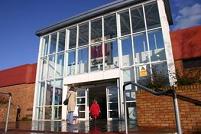.
“There was a man all alone; he had neither son nor brother. There was no end to his toil, yet his eyes were not content with his wealth. ‘For whom am I toiling,’ he asked, ‘and why am I depriving myself of enjoyment?’ This too is meaningless – a miserable business!” (Ecclesiastes 4:8)
Guest Blogger ~ Marie Sheahan Brown
Thursday, 4/5/12
9:00 am Pacific Time, near San Francisco
Miss Jane Marple, one of my favorite Agatha Christie detectives, lived and grew wise in the fictional country village of St. Mary Mead. The four cardinal virtues, the seven gifts of the Holy Spirit, and the seven deadly sins jostled there as neighbors. Being from a tiny village myself, I am acquainted with all of them. Such is the Human Condition.
Why would Blackburn, near Bathgate, West Lothian be any different?
When suddenly the careworn council house on Yule Terrace gleamed golden, its glow shone on vice and virtue all around. Susan seems wisely and slowly to be discerning one from another now that her village has expanded to seven continents.
For good reason, the Bible warns: “The love of money is the root of all kinds of evil” (1 Timothy 6:10a). Money, itself, is not the root, because it can support truly noble causes – like providing food, clothing, and shelter for one’s family. But the love of this medium of exchange (or its near relatives like fame and power) can point us away from goodness and nobility, away from peace within our hearts, away from peace among one another.
In four visits to Blackburn since 2009, I have sensed both darkness and light in the village. I have asked very few questions about Susan, yet locals, to my surprise, have volunteered information. With a small minority, my heart has felt heavy, sad, and confused. I have heard of at least one friendship ruptured by suspicion and whispered or public accusations, as if the internet troll had wormed his way into rooms of brick and mortar. The malodor stays with my spirit as a warning. I don’t know exactly what is going on, but I know all is not well when one or more of the seven peskies seem to hover in fetid darkness.
Conversely, I have encountered other locals – most notably our forum members stevieboy49, Little Tiger, moira, Scottish Mary, wullawonta, and their dear ones – who, having tested our sincerity, have responded to the higher ideals beckoning all of us. They celebrate Susan’s new life, respect and care about her as a person, seek no selfish gain, offer generosity, and live in gratitude for the expanding genuine friendships we share as a worldwide community of supporters. When I think of these friends, my heart lifts.
Let me be bold: This is what God wants for us, His beloved children, just as good parents rejoice when their children are happy, doing both good and well, and getting along.
The Beloved to whom I have professed my own vows said during the meal we re-live this Holy Thursday in kairos time: “I call you not servants but friends.”
In a kairos moment several weeks ago, I happened upon a thin paperback book lying on a table where it didn’t belong. I recognized the author’s name – Saint Aelred of Rievaulx – which I had learned only recently. This slim treasure, Spiritual Friendship, had been translated and published in 1977 by an American monastery of the popularly acclaimed saint’s ancient Cistercian order.
Born c. 1110 in Hexham, 23 miles west of Newcastle upon Tyne, Aelred was sent at about 15 to live in the court of King David I of Scotland. An esteemed member of the royal household, he stayed for about 10 years before entering the Cistercian monastery in Rievaulx in 1134. He became a beloved and prominent abbot at Rievaulx and made annual visitations to the abbey’s daughterhouses, including the beautiful Melrose Abbey, founded by King David I, about 40 miles south of Edinburgh. Saint Aelred died in 1167. He was known for holiness, kindliness, and wisdom. Upon the death of King David I, who had remained a close friend, Aelred wrote a eulogy documenting King (Saint) David’s own piety, virtues, and good works.
Aelred’s Spiritual Friendship starts with Cicero’s definition: “Friendship is mutual harmony in affairs human and divine coupled with benevolence and charity.” Aelred then develops these principles from a Christian view supported by Scripture, encouraging true spiritual friendship as a participation in God’s own inner Trinitarian life. He also identifies false friendships, placing them in two general categories: friendship for carnal pleasure, and friendship for material gain.
I found a beautiful summary by Sister Patricia Carroll, OCSO, a Cistercian nun:
http://www.catholicireland.net/spirituality/general/490-aelred-of-rievaulx-on-spiritual-friendship
If we follow Saint Aelred’s counsel, Susan is wise to discern the character and intent of people who approach her now that she is famous and wealthy. She is wise to live among people she has known her whole life, whose character and intent could not hide for long in a small village.
Many of us yearn to be true cuppa-tea friends with Susan. We surprise ourselves with this realization, because most of us never desire friendship with other celebrities whom we admire.
Why do we feel this way?
I believe that in our desire for genuine friendship with Susan, herself – which logistics make improbable for most of us – we are seeking to live ideals together with Susan and others.
We who traveled to Newcastle in person or in cyberspace, who have been forming friendships with one another as we support Susan’s career, seem drawn to the ideals of Truth, Love, Justice, and Beauty. Does not the famous audition video neatly depict the triumph of these ideals?
According to Father Robert J. Spitzer, SJ, PhD, and to his classical and biblical sources, these are the only goods that can bring true and lasting happiness (other goods are good, but insufficient). These also happen to be qualities of God for which our souls thirst. (Healing the Culture: A Commonsense Philosophy of Happiness, Freedom and the Life Issues)
Susan, by developing and offering her God-given gifts, attracts hearts to these ideals, and community forms around them. This is precisely how the gifts of God work, and He often uses the most humble and unlikely instruments. Susan acknowledges this in her book. We need not exalt Susan and put her on a pedestal – which is one reason many of us applauded when she put her foot down to “stay grounded” on Yule Terrace.
Susan intrigues us with her “many sides” so guilelessly offered or, if not safe, prudently withheld from view. Many of us genuinely want to be her friend in a comfortable mutual way. Must this be psychologized with suspicion and technical labels? No. Consider our unexpected friendships with people we have come to know thanks to Susan. We know when friendships are real and growing, based on mutual recognition of goodness and shared ideals. Such friendships can and ought to take time to develop (according to Saint Aelred), but if the foundations are strong, so the building will be.
Most of us enter friendship with personal imperfections. We all still must take stock and attend to the darkness and light within our hearts. Am I now being enticed by one of the seven deadlies, or is my heart moving toward goodness? I can choose to move toward goodness, which, like sparkling white snow, collects more as it rolls along.
Whether one is Christian or not, some handy lists from Galatians, Chapter 5, can help us sort out what’s going on inside and outside of us.
In the category of darkness we find: “immorality, impurity, licentiousness, idolatry, sorcery, hatreds, rivalry, jealousy, outbursts of fury, acts of selfishness, dissensions, factions, occasions of envy, drinking bouts, orgies, and the like.”
In the category of light we find: “love, joy, peace, patience, kindness, generosity, faithfulness, gentleness, self-control.”
We sense and are drawn to the goodness within Susan, which sparkles through the earthiness, the admitted outbursts, and the foibles we embrace because we love her foundational character and spirit, and because our hearts sing with her voice.
Those of us who would love to be true cuppa-tea friends with Susan feel no need to idealize her, to have her be other than who she is. Who among us does not settle with relief into the armchair of a good friend who accepts and loves us as we are? Such acceptance offers us the safety to be honest and to improve.
A true friend does not take something from us, nor do we take something from our friend. Attend to the message in your heart: Wanting to get something from someone feels different from sharing with someone. In true friendship, we give companionship and support mutually with joy – and with a good reserve of tolerance.
Nearly 100 good-hearted people from 15 countries and 20 of the United States of America gathered as a group in Newcastle. We were Catholics and other Christians, people of the Jewish faith or of no religious tradition (those are just the ones I know about). We were rich and not so rich, young and venerable, with various first languages and professions. If I had to choose one word to describe my impression of the people gathered, it would be “kindness.”
I enjoy traveling with Bonnie to Susa-events in part because we both honestly acknowledge our dreamed desire for true cuppa-tea friendship with Susan. I can attest that Bonnie enjoys true friendships in her life, as do I. Yet a tendency toward friendship is expansive. An open heart tends not to say, “Okay. I’ve had enough. I’ve just run outta love.” God’s friendship is exactly the opposite.
Lord, help us as you did Saint Aelred of Rievaulx.
“Two are better than one, because they have a good return for their work.” (Ecclesiastes 4:9)
.
Thursday, April 5, 2012
Blessing Blackburn Musical ~ Installment 8
Labels:
aelred,
bathgate,
blackburn,
king david i,
newcastle,
san francisco,
susan boyle,
west lothian
Subscribe to:
Post Comments (Atom)



I like your post , keep it up . really nice of article .
ReplyDeleteit support in blackburn